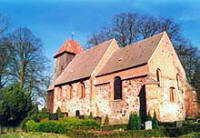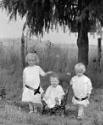During the 1800's, the north Germany province of Mecklenburg-Schwerin was comprised primarily of large agricultural estates. The owner of the estate was very powerful and maintained total control over the people who worked and lived on his land similar to the power a sovereign has over his subjects. Although technically, the people were not slaves, they had very little freedom of choice in how or where they lived. Their status was similar to that of the serfs on the great Russian estates of the times.
 Often, the main house of the estate was located in or near the local village. The village existed primarily to serve the needs of the estate. The estate owner often owned the grain mill and other businesses in the village too. Laborers and farm workers lived in the village and went from there each day out into the surrounding fields to work. The situation was similar to that of a “company town” during the industrial era. The workers labored for the land owner and then purchased goods such as cloth, metal ware or special foods from the company store in town.
Often, the main house of the estate was located in or near the local village. The village existed primarily to serve the needs of the estate. The estate owner often owned the grain mill and other businesses in the village too. Laborers and farm workers lived in the village and went from there each day out into the surrounding fields to work. The situation was similar to that of a “company town” during the industrial era. The workers labored for the land owner and then purchased goods such as cloth, metal ware or special foods from the company store in town.
The estate owner had almost a paternalistic power over the people, however, this could cut two ways. Since he controlled everything, he was insured of a steady source of cheap labor and could do basically as he pleased with those who lived on his estate. On the other hand, he was also duty bound to care for his workers from cradle to death.
 People born on a particular estate did not have the freedom to move to another place without the permission of the landowner. Before that permission was granted, the man had to have employment and a place to live already arranged. That was extremely difficult to do since, in the early to mid-1800's there was a general over-population on these estates. Most of them already had far too many people and certainly were not looking to gain more mouths to feed.
People born on a particular estate did not have the freedom to move to another place without the permission of the landowner. Before that permission was granted, the man had to have employment and a place to live already arranged. That was extremely difficult to do since, in the early to mid-1800's there was a general over-population on these estates. Most of them already had far too many people and certainly were not looking to gain more mouths to feed.
Since the landowner was obliged to take care of his workers, he could not just fire them and send them away. He had to continue to feed and clothe them regardless of whether there were too many of them for the work available.
 As a result of the overcrowding, the rulers of Mecklenburg decided to take steps to stop people from having so many children. They instituted laws that made it almost impossible for the average worker to get legally married. It became the law that a man must own a house before he would be allowed to get married. Unfortunately, the only property that could be obtained was from the estate owner and he could not afford to sell any of his property because it was his only means of support. Also, wages were so low that few, if any, workers could ever accumulate enough money for even a small down payment.
As a result of the overcrowding, the rulers of Mecklenburg decided to take steps to stop people from having so many children. They instituted laws that made it almost impossible for the average worker to get legally married. It became the law that a man must own a house before he would be allowed to get married. Unfortunately, the only property that could be obtained was from the estate owner and he could not afford to sell any of his property because it was his only means of support. Also, wages were so low that few, if any, workers could ever accumulate enough money for even a small down payment.
As with most efforts to legislate matters of morality, this law failed to meet its goal. The number of legally sanctioned marriages did plummet severely. In agricultural regions controlled by “noble owners” in the year 1841, for example, there was only one “legal” marriage for every 145 inhabitants. However, the number of births actually increased and well over half of the children were born out of wedlock.
 In spite of the restrictive marriage laws, the population of Mecklenburg increased dramatically during the mid-1800's. Eventually, it was common for there to be far more people living on the estate than were needed to do the work. As a result, the owners began to encourage workers to emigrate to other countries, primarily the United States.
In spite of the restrictive marriage laws, the population of Mecklenburg increased dramatically during the mid-1800's. Eventually, it was common for there to be far more people living on the estate than were needed to do the work. As a result, the owners began to encourage workers to emigrate to other countries, primarily the United States.
One way for a person to gain permission to marry was for him to agree to leave the estate and go to America. Sometimes, marriage licenses were conditioned upon emigration by the couple. Under these agreements, the bride and groom forfeited their rights to remain in their native village. Unmarried couples who hoped to own land and have a chance for economic opportunity by emigrating brought a booming business in marriage ceremonies during the 1860's and 70's.
In Mecklenburg, the average emigrant of this time was poor, often unmarried and usually day laborers or apprentices. In the early 1870's, 45% of those leaving Germany were from the Mecklenburg agricultural region.
The following
are a few articles on various aspects of life in Germany in the
late 1800s which may help to understand why so many chose to
give up everything and leave their beloved country.



